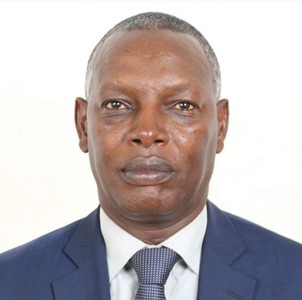President William Ruto has nominated Dr. Andrew Mwihia Karanja from Gatundu North as the new Cabinet Secretary for the Ministry of Agriculture and Livestock Development. This nomination comes at a crucial time when the country is seeking to enhance food security and improve the livelihoods of farmers and livestock producers.
Dr. Karanja brings over 35 years of experience in the public sector, both locally and internationally, in the fields of agriculture, rural development, and finance. He began his career as an extension officer at the Ministry of Agriculture and Livestock Development and later served as a Planning Officer in the same ministry. His extensive background includes roles such as Senior Agricultural Economist and Head of the Economics Department at the Coffee Research Foundation (CRF), where he contributed significantly to the reform of the coffee industry in the 1990s.
Throughout his career, Dr. Karanja has been involved in various capacities, including working with the Cocoa Board of Ghana, the International Coffee Organization (ICO), and the Intra-Africa Coffee Organization. He has also served as a researcher at the Tegemeo Policy Research Institute, focusing on the liberalization of the dairy industry. His work with international organizations such as the World Bank, African Development Bank, USAID, and the European Union has further solidified his reputation as a leading expert in agricultural policy and rural development.
The Kenya Livestock Producers Association (KLPA) has lauded President Ruto’s decision, highlighting Dr. Karanja’s deep understanding of the agricultural sector and his ability to navigate the complexities of public service. The association expressed confidence that his appointment would bring much-needed reforms and innovations to the ministry, particularly in enhancing the value chains from farm to fork.
Dr. Karanja’s nomination is seen as a strategic move to align with the Bottom-Up Economic Transformation Agenda (BETA), which prioritizes agriculture as a key pillar for economic stability and growth. His extensive network and experience with development partners are expected to play a crucial role in driving the ministry’s agenda forward. As Dr. Karanja steps into his new role, he faces the challenge of addressing critical issues such as access to quality and affordable farm inputs, improving







Thank you for your sharing. I am worried that I lack creative ideas. It is your article that makes me full of hope. Thank you. But, I have a question, can you help me?
I genuinely enjoy looking at on this website, it has superb posts. “One should die proudly when it is no longer possible to live proudly.” by Friedrich Wilhelm Nietzsche.
My husband and i felt really happy when Emmanuel could deal with his homework from your ideas he had through the weblog. It is now and again perplexing to just choose to be offering methods which often some people may have been making money from. Therefore we understand we have got the blog owner to thank for that. The main explanations you’ve made, the straightforward web site menu, the friendships you make it easier to foster – it’s mostly excellent, and it’s helping our son and the family consider that this article is pleasurable, and that is rather serious. Many thanks for all!
F*ckin’ remarkable things here. I am very glad to peer your article. Thanks a lot and i am looking forward to touch you. Will you please drop me a mail?
I love the efforts you have put in this, appreciate it for all the great posts.
With the whole thing which seems to be developing inside this specific area, all your opinions are quite radical. Nonetheless, I am sorry, but I do not give credence to your whole strategy, all be it stimulating none the less. It looks to everyone that your commentary are not totally validated and in simple fact you are your self not even thoroughly confident of the argument. In any case I did enjoy reading it.
Appreciate it for helping out, good information.
I like the helpful info you provide in your articles. I will bookmark your weblog and check again here regularly. I’m quite sure I will learn a lot of new stuff right here! Good luck for the next!
I have read some excellent stuff here. Certainly price bookmarking for revisiting. I surprise how so much effort you set to create such a magnificent informative website.
Wow! This blog looks exactly like my old one! It’s on a entirely different subject but it has pretty much the same layout and design. Outstanding choice of colors!
Those are yours alright! . We at least need to get these people stealing images to start blogging! They probably just did a image search and grabbed them. They look good though!
I don’t ordinarily comment but I gotta admit appreciate it for the post on this perfect one : D.
Some really nice and useful information on this website , also I think the style has got wonderful features.
Can you be more specific about the content of your article? After reading it, I still have some doubts. Hope you can help me.
Thank you for sharing excellent informations. Your web site is so cool. I’m impressed by the details that you have on this website. It reveals how nicely you understand this subject. Bookmarked this website page, will come back for extra articles. You, my pal, ROCK! I found just the information I already searched everywhere and just could not come across. What a great site.
This is a topic close to my heart cheers, where are your contact details though?
I do agree with all the ideas you have presented in your post. They’re very convincing and will certainly work. Still, the posts are very short for starters. Could you please extend them a little from next time? Thanks for the post.
Its superb as your other content : D, regards for posting.
I believe this internet site contains very superb indited content content.
An attention-grabbing discussion is price comment. I feel that it’s best to write more on this matter, it won’t be a taboo topic but usually persons are not sufficient to talk on such topics. To the next. Cheers
Your article helped me a lot, is there any more related content? Thanks!
I don’t think the title of your article matches the content lol. Just kidding, mainly because I had some doubts after reading the article.